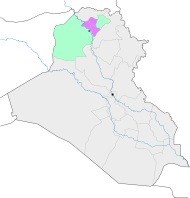Shekhan District
Appearance
(Redirected from Al-Shikhan District)
Shekhan District
قضاء شيخان قەزای شێخان | |
|---|---|
 | |
 | |
| Country | |
| Governorate | Nineveh Governorate (de jure), Duhok Governorate (de facto) |
| founded | December 16, 1924 |
| Seat | Ain Sifni |
| Area | |
• Total | 1,259 km2 (486 sq mi) |
| Population (2003)WFP program estimation[1] | |
• Total | 90,590 |
| Time zone | UTC+3 (AST) |
 |
| Part of a series on the Yazidi religion |
| Yazidism |
|---|
 |
The Shekhan District (Arabic: قضاء شيخان, Kurdish: قەزای شێخان, romanized: Qeza Şêxan) is a district in the Nineveh Governorate with its capital at Ain Sifni.[2][1]

It is bordered by the Amadiya and Dahuk Districts of the Dahuk Governorate to the north, the Akre District to the east, Al-Hamdaniya District to the south, and the Tel Kaif District to the west. Baadre, considered the political capital of the Yazidis, is also in this district.
History
[edit]
The Shekhan District was formed on December 16, 1924.[1] After the 1935 Yazidi revolt, the district was placed under military control.[3][4]
Demographics
[edit]| Year | Pop. | ±% |
|---|---|---|
| 1977 | 36,427 | — |
| 1987 | 54,559 | +49.8% |
| 2003 | 90,590 | +66.0% |
| Source: [1] | ||
It is mainly populated by Yazidis with a large Assyrian minority.[5]
See also
[edit]References
[edit]- ^ a b c d "Basic information about Shekhan District" (PDF). Christian Aid Program in Iraq. Archived from the original (PDF) on April 25, 2012. Retrieved October 7, 2014.
- ^ "Ninewa" (PDF). NGO Coordination Committee for Iraq (NCCI).
- ^ Wehrey, Frederic M. (2002). "The Insurgent State: Politics and communal dissent in Iraq, 1919-1936" (PDF). DTIC. Archived from the original on November 14, 2012.
- ^ Fuccaro, Nelida (1997). "Ethnicity, State Formation, and Conscription in Postcolonial Iraq: The Case of the Yazidi Kurds of Jabal Sinjar" (PDF). International Journal of Middle East Studies. 29 (4): 559–580. doi:10.1017/S002074380006520X. JSTOR 164402.
- ^ Shefler, Gil (August 7, 2014). "Islamic State accused of capturing Yazidi women and forcing them to convert, or else". Washington Post. Religion News Service. Retrieved October 7, 2014.


